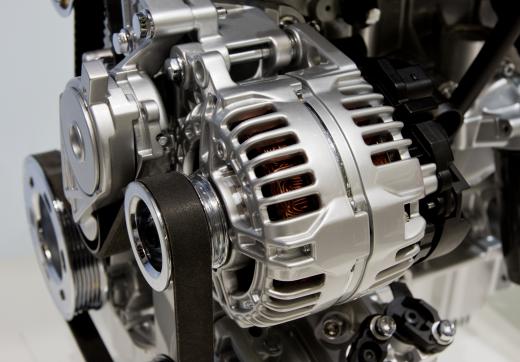A fan pulley is, as its name implies, a pulley that is attached to a fan. The pulley is a metal or hard plastic wheel with a grooved outer rim. The groove usually is V-shaped and is constructed to match a belt that fits into it. When the belt moves, it spins the pulley, which turns a hub and twirls the attached fan blades.
The job of the fan is to move air. It has two or more long flat blades attached at one end to a central hub. When the hub spins, the blades also spin, and because the blades are slightly angled, they grab the air and push it behind them. Fans can be mounted directly on the shaft of a motor, but this is not always convenient. A fan pulley is used when the motor is some distance away from the fan and the power from the motor needs to be transferred to the fan to make it spin.

Fans and fan pulleys are a vital component of many automobile engines, which produce a surplus of heat. This heat must be removed to keep the engine from overheating and burning up its lubricating oil. Water is circulated through the interior of the engine and pumped into a radiator, which absorbs heat from the water. A fan, often driven by a fan pulley, is mounted close to the radiator. The fan draws air across the radiator so that the air can absorb heat, which it then carries away.
In high-speed fan pulleys, such as in automobiles, it’s critical that there is a good fit between the drive belt and the fan pulley. A wheel is positioned against the belt to maintain the proper tension between the belt and pulley to keep the belt from slipping. When the sides of the groove in the fan pulley become worn, the belt will ride entirely on the bottom of the groove, causing the fan to stop working.
Fans and fan pulleys predate the industrial age. In hot climates, fans were used to cool people — and humans were the motors used to turn them. In some cases, a slave or servant cranked an arm lever or a foot treadle, and the fans were mounted overhead, where a series of pulleys transmitted the power via ropes.
